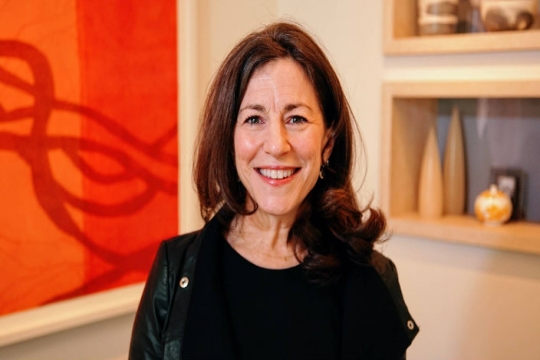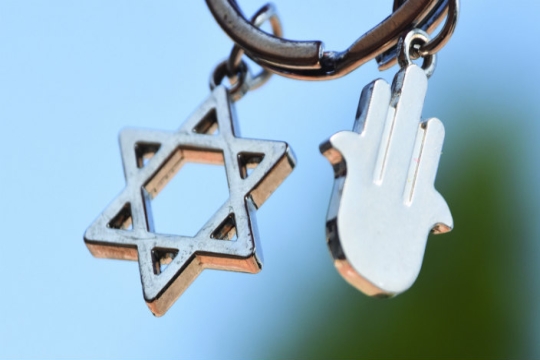Learning From Adam and Eve About Love and Relationships

 Bruce Feiler has written six consecutive bestsellers, including Walking the Bible (which became a PBS series) and The Secrets of Happy Families: Improve Your Mornings, Tell Your Family History, Fight Smarter, Go Out and Play, and Much More. His latest book is The First Love Story: Adam, Eve, and Us.
Bruce Feiler has written six consecutive bestsellers, including Walking the Bible (which became a PBS series) and The Secrets of Happy Families: Improve Your Mornings, Tell Your Family History, Fight Smarter, Go Out and Play, and Much More. His latest book is The First Love Story: Adam, Eve, and Us.
ReformJudaism.org: What compelled you to traverse four continents and 4,000 years to explore the Bible’s first couple?
I have spent most of the last 20 years thinking about the Hebrew Bible, focusing on the importance of land and its relationship to religious identity. I now realize that there’s not just a Promised Land; there’s also promised love. Adam and Eve introduced the idea of love into the world and they continue to share our deepest feelings about relationships, family, and togetherness.
As absurd as it may sound, the story of Adam and Eve brings some timeless wisdom into the timely conversation so many of us are having as we struggle to figure out how men and women are supposed to relate to each other.
Why have you made the goal of your book to “reclaim” the first love story?
Adam and Eve are victims of the greatest character assassination the world has ever known. They have been blamed for bringing shame, sin, even death into the world. Eve especially has been scapegoated; even worse, this story at the bedrock of our culture has been weaponized as a way for men to keep women down. Viewing the first couple’s relationship as one of failure has given us permission to fail in our own relationships, rather than work to repair them and move forward.
What in your view makes Adam and Eve a successful love story?
At the heart of their relationship is equality. Eve is created from Adam’s side, and yet Adam clings to her. Eve initiates the crisis in the relationship because she doesn’t want to be subjugated by Adam. Eve wants knowledge and goes out to grab it, but she realizes she wants a relationship too. Adam is also at a crisis point and chooses companionship over duty. They then leave Eden. Adam initiates lovemaking that begets children, and, in two cases, Eve is responsible for naming them. I see in their relationship constancy, a stick-to-itiveness, a give and take, the ability to mend ruptures, and commitment to make the relationship work.
Success for God, who gives Adam and Eve the power of procreation and commands they “be fruitful and multiply,” depends on whether the first couple can find a way to fulfill that commandment. I think that is the central question of the story.
What lessons about relationships with our children can we learn from the experiences of the Bible’s first family?
The rabbis talk of a period of separation between Adam and Eve after Cain murders Abel. I think that the single most powerful moment in the story, which everyone forgets, is that Adam and Eve eventually forgive each other and come back together. They have another son, Seth, who goes on to populate the human line, fulfilling the original commandment to go forth and multiply. I think the lesson here is not to blame the parents for the behavior or misbehavior of the children, but to credit the parents for their ability to move beyond the crisis.
Has writing this book changed the way you think about your own marriage and how you relate to your wife and family?
Absolutely. I have a working wife and soon-to-be 12-year-old identical twin daughters. She’s a CEO in her own right, and we spend a lot of our time balancing who takes the lead in what, and that’s no longer tied to traditional gender roles. I’ve learned that love is a story we tell with another person. It’s co-creation through co-narration. Love is a choice we make, and remake, and remake again.
All other major biblical figures in the Jewish tradition are singular. Adam and Eve are the only ones remembered as a couple. Theirs is the first joint byline. And their story shows us that when you get into difficulties in your relationship, you should add a new chapter in your story. Basically, love is the process of continually revising and retelling your own love story in real time.
Bruce Feiler will be a featured speaker at the Union for Reform Judaism Biennial in Boston, December 6-10, 2017, where he will discuss his latest book, The First Love Story: Adam, Eve, and Us.
Related Posts

Feminism, Female Protagonists, and Finding Ourselves in Biblical Narratives

Israeli Poems to Get Us Through Times of Fear and Isolation


